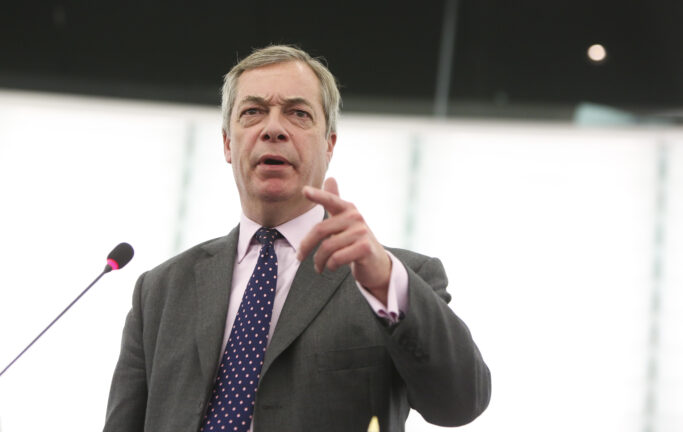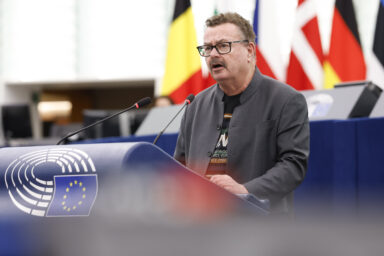A US congressional hearing on European digital regulation was supposed to ease transatlantic tensions concerning the matter. Instead, it laid bare profound disagreements, blending concerns over free speech, tech dominance, and US domestic political fissures.
The session heard a rather wild mix of pragmatic remarks and ideological arguments, the latter often maintaining only the most tangential of connections to reality. Chaired by Jim Jordan, a Republican from Ohio, the House Judiciary Committee session framed EU laws like the Digital Services Act (DSA), as well as Britain’s Online Safety Act (OSA) as existential threats to American liberties. Democrats, led by Maryland’s Jamie Raskin, accused Republicans of hypocrisy—ignoring Donald Trump’s authoritarian drift while decrying European overreach.
The hearing came on the back of potentially groundbreaking legal battles one of the Big Tech companies is waging simultaneously on both sides of the Atlantic. On Tuesday, Alphabet’s unit Google lost—technically speaking—an antitrust case against the US Department of Justice.
However, “it’s hard to read Judge Amit Mehta’s ruling as anything other than a win for the search giant,“ a Bloomberg analyst wrote. Industry insiders mostly agreed. “Google escaped the toughest remedy—a forced sale of its Chrome browser—and the judge watered down the Justice Department’s data-sharing request. In earlier court cases, Google swiftly issued statements attacking the judgments and foretold of ominous harms to consumers,“ the analysis reads.
You might be interested
To fine or not to fine?
On the same day, EU antitrust regulators have delayed fining Google over its adtech business, while waiting for the US to cut tariffs on European cars as part of a trade deal, various news outlets reported. The move did not exactly testify to the EU’s oft-cited regulatory resolve. The move elicited strong criticism from the S&D faction of the European Parliament. The group warned “the European Commission not to yield to the threats and to enforce the digital acquis as intended, … no matter how angry it makes President Trump”.
Meanwihle, France slapped Google (along with China’s Shein) with massive fines for breaching laws on internet cookies, Politico reported. The CNIL regulator fined Google a record €325m “for displaying advertisements between Gmail users’ emails without their consent and for placing cookies when creating Google accounts, without valid consent of French users,” the watchdog said in a statement announcing the move late Wednesday — just as US lawmakers revelled in denouncing the European regulatory mindset.
Instead of cutting red tape, the EU and UK target American success. — Chair of US House Judiciary Committee Jim Jordan, Republican from Ohio
Mr Jordan opened the hearing with a fiery indictment of Europe’s “censorship industrial complex”. He argued that Brussels weaponises regulation to undermine the First Amendment. “The DSA and OSA force US companies to adopt content rules that trample free speech,” he said. He cited EU Internal Market Commissioner Thierry Breton’s threat to Elon Musk’s X as proof of “censorship-by-intimidation”. He warned that compliance compels platforms to “globally enforce speech codes written by unelected bureaucrats”.
Political sideshow
Mr Jordan framed the laws as protectionist tools masquerading as child-safety measures, designed to hobble American innovation. “Since 2000, European tech firms have languished behind US counterparts. Instead of cutting red tape, the EU and UK target American success,” he thundered. He warned of a “digital curtain” descending across Europe, with China as beneficiary.
Mr Raskin dismissed the hearing as a “political sideshow”, mocking Republican focus on Europe amid Mr Trump’s domestic crackdowns. “The star witness isn’t a human-rights leader like (murdered Russian dissident Alexei) Navalny, but a far-right, pro-Putin politician,” he said, referencing arch-Brexiteer (and current poll leader) Nigel Farage.
The DSA’s ‘trusted flaggers’—state-approved NGOs—prioritise takedowns of religious or conservative speech. — Lorcán Price, Irish barrister with ADF International
Mr Raskin linked European content laws to US precedents: “We restrict child pornography, defamation, scams—speech the First Amendment doesn’t protect.” He accused Republicans of ignoring Mr Trump’s assaults on academia, media and civil servants: “Americans fear he’s rewriting history, banning books and censoring critical news.”
Porn wins out
Witness testimony exposed regulatory fault lines. Morgan Reed of the App Association, representing small US tech firms, condemned Europe’s “compliance-first” ethos. “The DMA creates leadership in red tape, not innovation,” he said, noting 85 per cent of European startups rely on US cloud services now subject to strict data-localisation rules.
Mr Reed cited Apple’s forced hosting of porn aggregator Hot Tub under DMA “must-carry” mandates as “regulatory collateral damage”, arguing Brussels’ rules “protect legacy corporations, not innovators”. Mr Reed warned startups face compliance costs that entrench giants: “They’ll partner with big platforms or quit Europe.” This marked a rather rare argument anchored in practice rather than ideology.
At what point did we become North Korea? Tell Starmer: repeal this madness, or lose US tech investment. — Nigel Farage, leader of Reform UK party
Lorcán Price, an Irish barrister with Alliance Defending Freedom International, catalogued European prosecutions: a Finnish MP fined €6,900 for tweeting Bible verses, a Scottish grandmother arrested for silent prayer near an abortion clinic, and a German pensioner raided for calling a politician “incompetent”. “The DSA’s ‘trusted flaggers’—state-approved NGOs—prioritise takedowns of religious or conservative speech,” he said.
The ‘Brussels effect‘
Mr Price warned the EU’s ‘Brussels effect‘ lets it “export censorship globally”, citing German prosecutors demanding data on a US teenager’s anti-migration post. He highlighted contradictions: “Germany prosecutes anti-migration posts while funding Huawei’s 5G rollout.” His point resonates with the EU practice’s domestic critics.
Nigel Farage, Reform UK leader, framed Britain as a cautionary tale. “Lucy Connolly—a grieving mother—got 31 months for a deleted tweet criticising multiculturalism, while rapists walk free,” he said. Mr Farage linked the OSA to Labour’s proposed Islamophobia laws, which would criminalise mocking Sharia: “They’re replacing Magna Carta with state-mandated piety.”
Europe’s laws aren’t perfect, but they’re subject to democratic debate, unlike Trump’s edicts. — David Kaye, law professor at University of California, Irvine
The Reform leader skewered Britain’s “schizophrenia”: arresting gender-critical voices while outsourcing cybersecurity to China’s ByteDance. “At what point did we become North Korea?” he asked, urging Congress to pressure London: “Tell (Prime Minister Sir Keir) Starmer—repeal this madness, or lose US tech investment.”
Ripe for abuse
David Kaye, a UN free-speech rapporteur, offered tempered criticism. “The DSA’s transparency rules empower users—but its ‘systemic risk’ clauses are ripe for abuse,” he said. Mr Kaye contrasted Europe’s democratic process with Mr Trump’s “retribution regime”, citing deportations of student visa-holders for pro-Palestine op-eds and NIH grants frozen over climate research. “The First Amendment isn’t safe while Trump sues CBS for $16m over a Kamala Harris interview,” he said. Mr Kaye acknowledged EU strides—like banning facial recognition under its AI Act—but warned: “Without US cooperation, it’s unenforceable.”
Republicans zeroed in on the DSA’s extraterritorial reach. Thomas Massie, a Kentucky Republican, grilled Mr Price on EU fines—six per cent of global revenue—for non-compliance: “If Germany calls ‘take back our country’ hate speech, must Google ban it worldwide?”
If Macron can criminalise ‘fake news,’ so can Modi and Erdoğan. — Morgan Reed of App Association
Lorcán Price confirmed the Congressman’s worries.“ US users would lose access to lawful speech to protect EU profits,” he said. Chip Roy, a Texas Republican, dissected the OSA’s vagueness—criminalising speech causing “non-trivial psychological harm”—and its 12,183 UK arrests in 2023. “Europe is redefining hate speech to silence dissent,” he warned.
Purging critics
Democrats pivoted to domestic repression. Zoe Lofgren, a California Democrat, cited the case of Rümeysa Öztürk. The Tufts PhD student was deported for pro-Palestine op-eds, and journalist Mario Guevara, detained after livestreaming protests. “Trump’s ICE uses visa screens to purge critics—real censorship isn’t in Brussels,” she said. Jerry Nadler, a New York Democrat, listed Mr Trump’s targets: suing CBS, blacklisting law firms defending protesters, and editing Smithsonian exhibits to downplay slavery.
The hearing revealed transatlantic paradoxes. Republicans, traditionally sceptical of regulation, championed small tech firms chafing under EU rules. Democrats, often critical of Silicon Valley, defended Europe’s attempts to check platform power. Mr Kaye encapsulated the tension: “Europe’s laws aren’t perfect, but they’re subject to democratic debate, unlike Trump’s edicts.” Mr Farage’s presence underscored odd alliances: a Trump ally, he lambasted Britain’s “police state”. Democrats, on the other hand, noted his admiration for Putin and opposition to Ukraine aid.
A splintered internet of jurisdictional silos could be innovation’s death knell. — ranking member of US House Judiciary Committee Jamie Raskin, Democrat from Maryland
The debate circled a core dilemma: who controls the digital public square? Mr Jordan’s camp envisions a US-led internet bound by First Amendment principles. Mr Raskin’s warns of Trumpist authoritarianism corrupting that ideal. Europe forges a third path—prioritising privacy and fairness over libertarian free-for-all.
Floors, not ceilings
Unresolved tensions lingered over innovation and sovereignty. Mr Jordan noted no European firm ranks among the world’s top 20 tech companies. “The DMA isn’t about fairness—it’s about taxing US success.” Mr Reed agreed, citing Spotify’s lobbying for DMA rules that cripple Apple Music: “Europe protects oligopolies, not startups.” Europe’s model empowers autocrats, Mr Farage warned: “If Macron can criminalise ‘fake news,’ so can Modi and Erdoğan.” Mr Raskin retorted: “Trump’s FCC bullies Paramount into pro-MAGA bias—he’s the bigger threat.”
If we lose the internet to bureaucrats or strongmen, we lose the 21st century. — US Congresswoman Victoria Spartz, Republican from Indiana
As Ukraine-born Indiana Republican Victoria Spartz noted, the clash transcends tech policy. “It’s about whether democracies can govern digital spaces without replicating the censorship they condemn,” she said. With the EU finalising its AI Act and Mr Trump eyeing a 2025 regulatory rollback, the transatlantic rift over speech, power and innovation will deepen. “If we lose the internet to bureaucrats or strongmen, we lose the 21st century,” she made a point. It could be heard as criticism of the status quo in Europe as well as in the US.
The so-called Brussels effect remains a lightning rod—both shield and cudgel in a fragmenting digital order. For Europe, the challenge is balancing democratic oversight with Silicon Valley’s power without alienating its closest ally. For the US, the question is whether Congress can defend free speech without enabling domestic authoritarianism. As Mr Kaye urged: “Set global floors for free speech, not ceilings.” The alternative—a splintered internet of jurisdictional silos—could be, as Mr Reed warned, “innovation’s death knell.”










